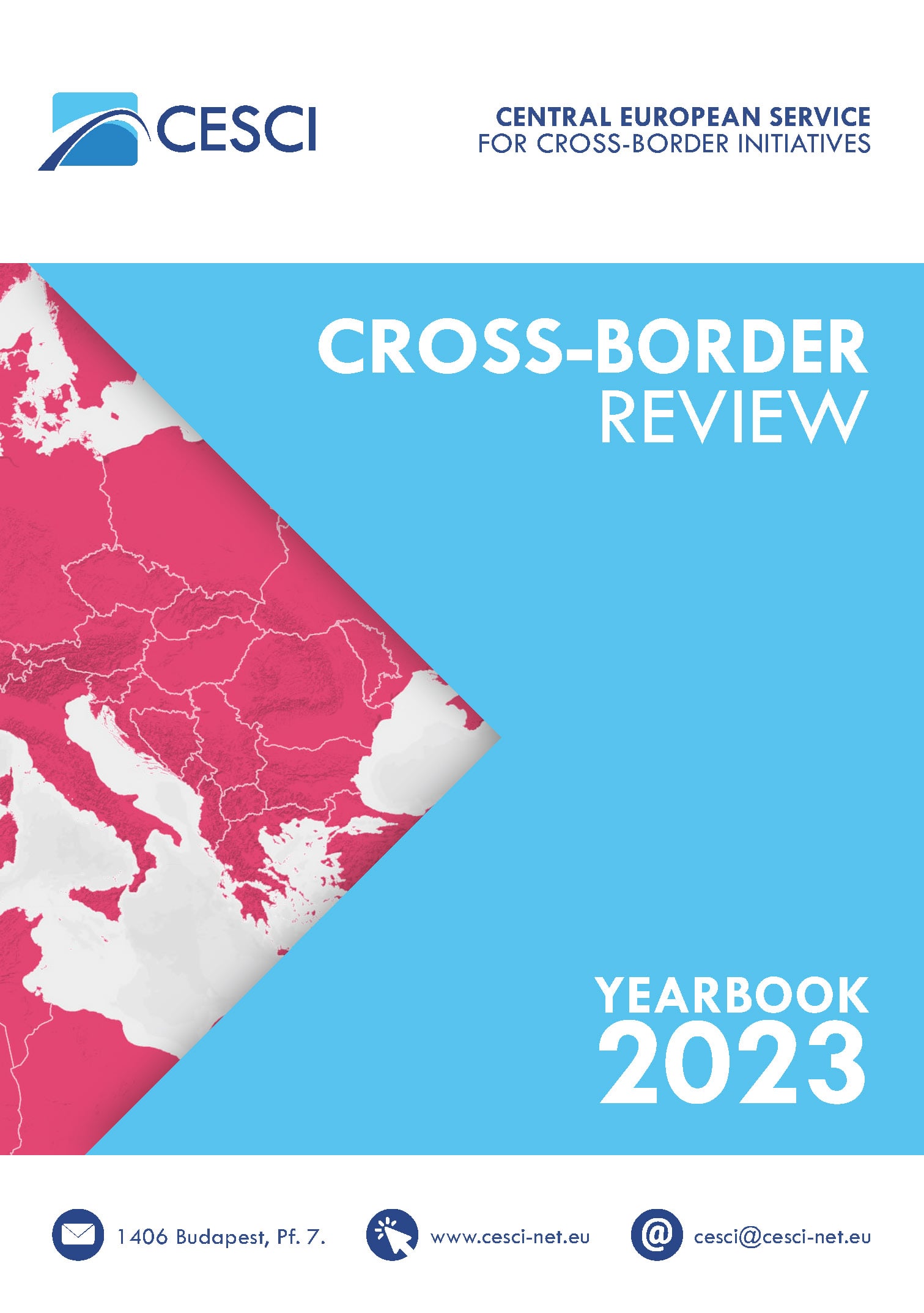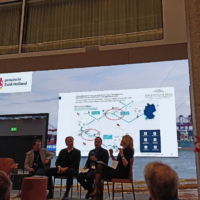
- Editor-in-Chief: James W. Scott
- Publisher: CESCI Europe Institute
- Territory: Europe
- Year of publication: 2023
- Type: Publication
- Language: English
- Number of pages: 118
- ISSN 2064-6704
The publication is downloadable chapter by chapter via the contents.
Cross-Border Review 2023
The ‘Cross-Border Review 2023’ is CESCI’s tenth yearbook, which is published this year in collaboration with the UPS-CESCI Research Group of Cross-Border Cooperation. The study volume analyses the importance of cross-border cooperation, emphasising knowledge exchange and social innovation. The authors also examine the sharp decisions made in the field of democracy, governance and personal freedom, highlighting the positive social benefits of cross-border cooperation.
The scientific yearbook of Central European Service for Cross-border Initiatives (CESCI) edited by James W. Scott (Professor of Regional and Border Studies, University of Eastern Finland), is published online in English.
Contents
Introduction
James W Scott: Transcending Borders and Boundaries through Dialogue: The 2023 Cross-Border Review
Experiences of Project-Based Cooperation
Martin Barthel: Place Borders in Urban Planning
Kata Keresztély and Krisztina Keresztély: Where no words are needed: Overcoming linguistic and cultural barriers through visual creativity
Magdalena Klarenbach and Kamila Franz: European youth and climate activism – the art of debate
Alicja Fajfer: Intercultural communication in problem-based learning
Theoretical Debates
Kadri Kangro: A Relational Lens on Social Innovation: Tracing Roots to Transboundary Transformative Dynamics
Leszek Koczanowicz and Wojciech Ufel: Deliberation and its theories across the landscape of political practices. Key evolutions of this concept in the EUARENAS project
Research Notes on “Bordering” and Border Studies
James Scott: Border studies as an “evolutionary” research field
Maxine Salmon-Cottreau: Reshaping LGBTQ+ rights in Poland
Teodor Gyelnik and Gyula Ocskay: Project note on the strategic project ‘Promotion of legal accessibility across the Slovak-Hungarian border’
Book Reviews
Teodor Gyelnik: Review of Post-Soviet Borders
Teodor Gyelnik: Review of Public Policies for Territorial Cohesion
Editorial notes
James W. Scott
With the ongoing conflict between Russia and Ukraine showing no signs of letting up, a certain exhaustion might be emerging that distracts our attention regarding what is at stake. It is, perhaps, overstatement to characterise this conflict as “civilisational”, but is certainly about some stark choices in terms of governance and personal freedom. It is not simply about democracy understood as a pluralistic system that adheres to the rule of law. It is also about social development, innovation and the use of knowledge for the greater benefit of society-at-large. Cohesion can be constructed through cooperation and dialogue or it can be imposed by brute force and autocracy. In the latter case, cross-border cooperation, horizontal processes of social innovation and development are seen as threats to the existing power structure. Social innovation often entails challenges to the status quo: it can raise uncomfortable questions that mainstream politics has either been unwilling or unable to address.
For several decades now cross-border cooperation (CBC) has flourished within Europe as a form of knowledge-exchange and co-development that has benefitted among others local governments, civil society organisations, planners, business communities, environmentalists and promoters of sustainable tourism. While cross-border cooperation has certainly been exploited as a profit-taking exercise, its overall societal benefits are undisputed. The impacts of CBC are particularly evident if we go beyond direct territorial referencing and think of CBC in terms of boundary transcending as a ubiquitous phenomenon – one that happens even without the support of INTERREG. This issue of the Cross Border Review focuses on broader understandings of boundary-transcending through cooperation and dialogue. By this we not only suggest overcoming the constraints of nationally bordered thinking, for example by creating new cooperation spaces beyond territoriality, but also to enlarge our existing social boundaries in order to attain greater understanding of how the world works. One way to frame this perspective is to characterise it in terms of community-building at different levels and within different contexts. Ultimately, borders are not only constructed by states, they are also made and re-made by everyday individuals as well as defined by patterns of interaction and exchange.
The insights that the contributors to this volume provide are both conceptual and practical in nature. Moreover, they indicate that the main resource for border-transcending is that of knowledge exchange. The examples that they provide range from of civil society activism, artistic production, special education and local experiments in local democracy. In their different ways these examples indicated how the promotion of horizontal learning processes by gathering knowledge from diverse local, national and European spaces where social innovation is being practiced. Social processes such as the creation of communities of practice across borders could also work against fragmentation by promoting a sense of common cause in areas such as climate change, social inclusion and equality.

